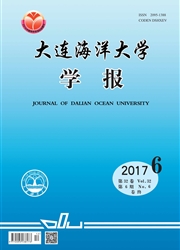

 中文摘要:
中文摘要:
在水温11.0~20.0℃、盐度35、pH7.5的实验室条件下,将初始平均体质量为3.89g的仿刺参Apostichopusjaponicus幼参放养在60L的塑料水槽中,投喂添加30、60、90mg/kg β-胡萝卜素和虾青素的饲料,分别记为A、B、C、D、E、F组,以不添加此物质的基础饲料作为对照(G组),每组设3个重复,饲养80d后测定幼参的生长和几种抗氧化酶的活性。结果表明:摄食添加β-胡萝卜素的饲料时,仿刺参的特定生长率随添加量的增加而升高,A、B、C组分别比对照组提高6.67%、73.33%和100.0%,但仅C组与对照组差异显著(P〈0.05);摄食添加60mg/kg和90mg/kg虾青素的饲料时,仿刺参的特定生长率比对照组提高113.33%和66.67%,但仅E组与对照组差异显著(P〈0.05);试验组仿刺参体腔液中的总抗氧化能力(T-AOC)随饲料中β-胡萝卜素和虾青素含量的增加而升高,除A、B组外其余各试验组均显著高于对照组(P〈0.05),饲料中添加虾青素的各组仿刺参体腔液的平均总抗氧化能力(12.77U/mL)比添加β-胡萝卜素的各组平均值(8.77U/mL)高45.61%,表明虾青素的抗氧化能力高于β-胡萝卜素;C、E、F组仿刺参体腔液中的SOD和CAT活性均显著低于对照组(P〈0.05),而A、B、D组与对照组差异不显著(P〉0.05);试验组仿刺参肠道蛋白酶和淀粉酶活力及体壁成分较对照组均无显著差异(P〉0.05)。
 英文摘要:
英文摘要:
Sea cucumber Apostichopus japonicus with initial body weight of 3.89 g were stocked into 60 liter plastic tanks and fed the diets supplemented with β-carotene( groups A, B, and C) or astaxanthin( groups D, E, and F) at a dose of 30 mg/kg, 60 mg/kg, and 90 mg/kg ( without supplementation as control group, F) with triplication at water temperature of 11.0-20.0 ℃, a salinity of 35, and pH 7.5 for 80 days. The growth of the sea cucumber was monitored in a 20 day interval by specific growth rate (SGR), and total antioxidant capability (T-AOC), and activities of superoxide dismutase (SOD) , and catalase (CAT) were determined at the end of the experiment to e- valuate the effects of the additional β-carotene and astaxanthin on the antioxidation in the sea cucumber. There was increase in SGR in the sea cucumber fed the diets supplemented with β-carotene with the enhanced supplemental levels, 6.67% higher in the 30 mg/kg group, 73.33% higher in the 60 mg/kg group, and 100.0% higher in the 90 mg/kg group than that in the control group, and significantly different in group C from that in the control group (P〈0.05). The sea cucumber fed the diets supplemented with astaxanthin at a dose of 60 mg/kg and 90 mg/kg had 113.33% and 66.67% higher SGR than the sea cucumber fed the control diet did, the animals in group E having significantly higher SGR than the animals in the control group (P〈0.05). There was significant increase in T-AOC in the coelomic fluid in the sea cucumber fed the diets supplemented with β-carotene and astaxanthin with the enhanced supplemental levels (P〈0.05) except for in groups A and B. The sea cucumber fed the diets supple- mented with astaxanthin ( 12.77 U/mL) had 45.61% higher coelomic fluid T-AOC than the sea cucumber fed the diets supplemented with β-carotene (8.77 U/mL) did, astaxanthin leading to higher antioxidation. In the activi- ties of SOD, and CAT, however, there were significantly lower in the sea cucumber fed the diets supplemented
 同期刊论文项目
同期刊论文项目
 同项目期刊论文
同项目期刊论文
 期刊信息
期刊信息
